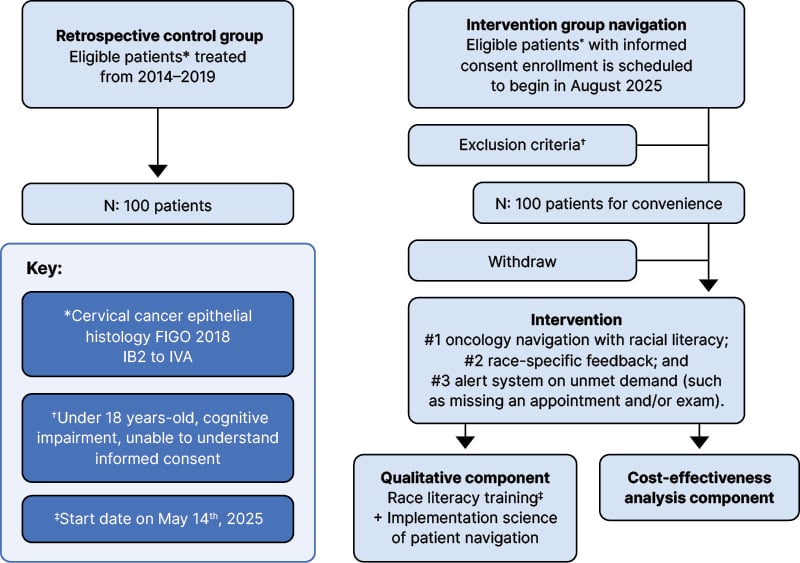BACKGROUND
Cervical cancer is the third most prevalent cancer in Brazilian women. Around 17,000 new cases are expected for Brazil’s 2023–2025 triennium.1 The complex multimodal treatment of locally advanced cervical cancer (LACC), which relies on platinum-based chemoradiotherapy (CRT) and brachytherapy (BT), along with the significant healthcare demands of patients with cervical cancer, creates challenges for a universal health system. The Black population experiences the highest cancer mortality rates compared to the general population, partly due to inequalities in social, economic, political, and health areas contexts. Data show that, compared to White women, the mean age-adjusted mortality rates according to race/skin color were 27% higher in Black women. Around 60% of Black patients receive a cervical cancer diagnosis at a locally advanced or advanced stage. The incidence rate among Black women was found to be significantly higher than that of their White counterparts, with a relative risk of incidence nearly 50% higher.2 This disparity cannot be ignored. However, addressing racial and ethnic disparities in oncology care and health outcomes is complex and scarce,3 mainly in low- and middle-income countries. Research into the implementation of complex interventions in care is urgently needed.
METHODS
The authors’ study is based on Public Health Critical Race Praxis.4,5 It is inspired by the Accountability for Cancer through Undoing Racism and Equity (ACCURE) initiative pragmatic trial, composed of three anti-racist actions: (1) oncology navigation with racial literacy, (2) real-time medical record alert system, and (3) race-specific feedback.6,7 The authors’ intervention, in turn, consists of oncology navigation with racial inequities training, and improving interprofessional team knowledge about race and diversity through race-specific feedback. This prospective, single-center, non-randomized clinical trial of anti-racist actions and treatment support will compare prospective patients with a historical control group from the same hospital (Figure 1). The primary endpoint is to increase the completion rate of definitive treatment with CRT+BT for 100 patients with Stage IB2–IVA cervical cancer (convenience sample). The secondary endpoints are to analyze the implementation policy of this strategy and to make an economic assessment of the use of this implementation (the authors hypothesize that such measures reduce both visits to the emergency room due to toxicity, and admissions to wards and ICU). This study has ethics committee approval from the Faculdade de Medicina de São Paulo, Brazil, with the number 85819325.0.0000.0068. Patient inclusion is expected to begin in August 2025. Nurses are receiving training in oncology navigation.8 Racial literacy in healthcare was offered to the entire hospital workforce,9 and this training started on May 14, 2025. As this is a race-conscious trial, the researchers plan to prospectively compare outcomes between the Black/Brown and non-Black/Brown patients in the intervention group. In addition, given Critical Race Praxis, the research team comprises Black women in the creation, design, and throughout the entire study continuum, and the results will support the implementation of racial equity policies,5 in a country where 56% of the population is Black.10

Figure 1: Study design of RACED.
FIGO: International Federation of Gynecology and Obstetrics.







